Many people are unsure if they can use purified water in a humidifier. The answer is yes, you can! Purified water is a great choice for humidifiers because it doesn’t contain any impurities or minerals that could clog the machine or cause it to run less efficiently. This article will discuss the theme of water types that can be used in humidifiers and the benefits of using purified water in a humidifier. It will also provide some tips on how to get the most out of your machine.
How does the Humidifier work?
A humidifier is a household appliance that increases the humidity of a room. This is beneficial in the winter months when the air is dry and can cause nasal congestion, skin problems, and other health issues. Most humidifiers work by heating water until it boils and then emitting steam into the room.
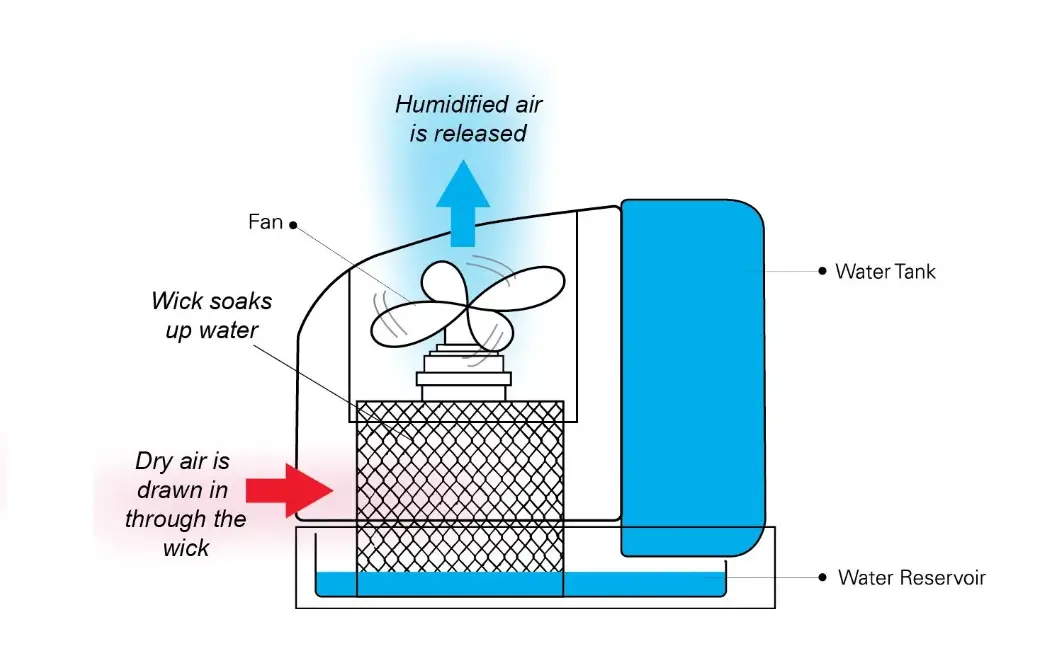
The humidifiers are constructed with a water tank that needs to be refilled regularly. Moreover, it is equipped with a wick that soaks up water from the tank and a fan that blows air over the damp wick, causing evaporation. It is powered by electricity.
The type of water you use in your humidifier can have an impact on your health and the operation of the humidifier. It means that you should not use just any water to fill up your humidifier. Some types of water can be used for humidifiers [1].
What are Types of Water suitable for a Humidifier?
Tap Water
Tap water is the most commonly used type of water for humidifiers. It’s easy to come by and usually doesn’t require any special treatment. The main downside of using tap water in a humidifier is that it can contain minerals that can build up on the inside of the machine. This can lead to problems with the performance of the humidifier and, in some cases, can even damage it. If you do use tap water in your humidifier, be sure to clean it regularly to prevent mineral buildup. Additionally, you should more often replace the filter in your humidifier if you use tap water.
Distilled Water
Distilled water is water that has been boiled and then condensed back into a liquid. This process removes all of the impurities from the water, including minerals, bacteria, and other contaminants. Because of this, distilled water is often used in medical settings where it’s important to have sterile conditions. For humidifiers, using distilled water can help extend the life of your machine by preventing mineral buildup and reducing the need for frequent filter changes. Additionally, it can also help improve the performance of your humidifier by preventing clogs and other issues. The downside of using distilled water is that it can be more expensive than other types of water and can be difficult to find in stores.
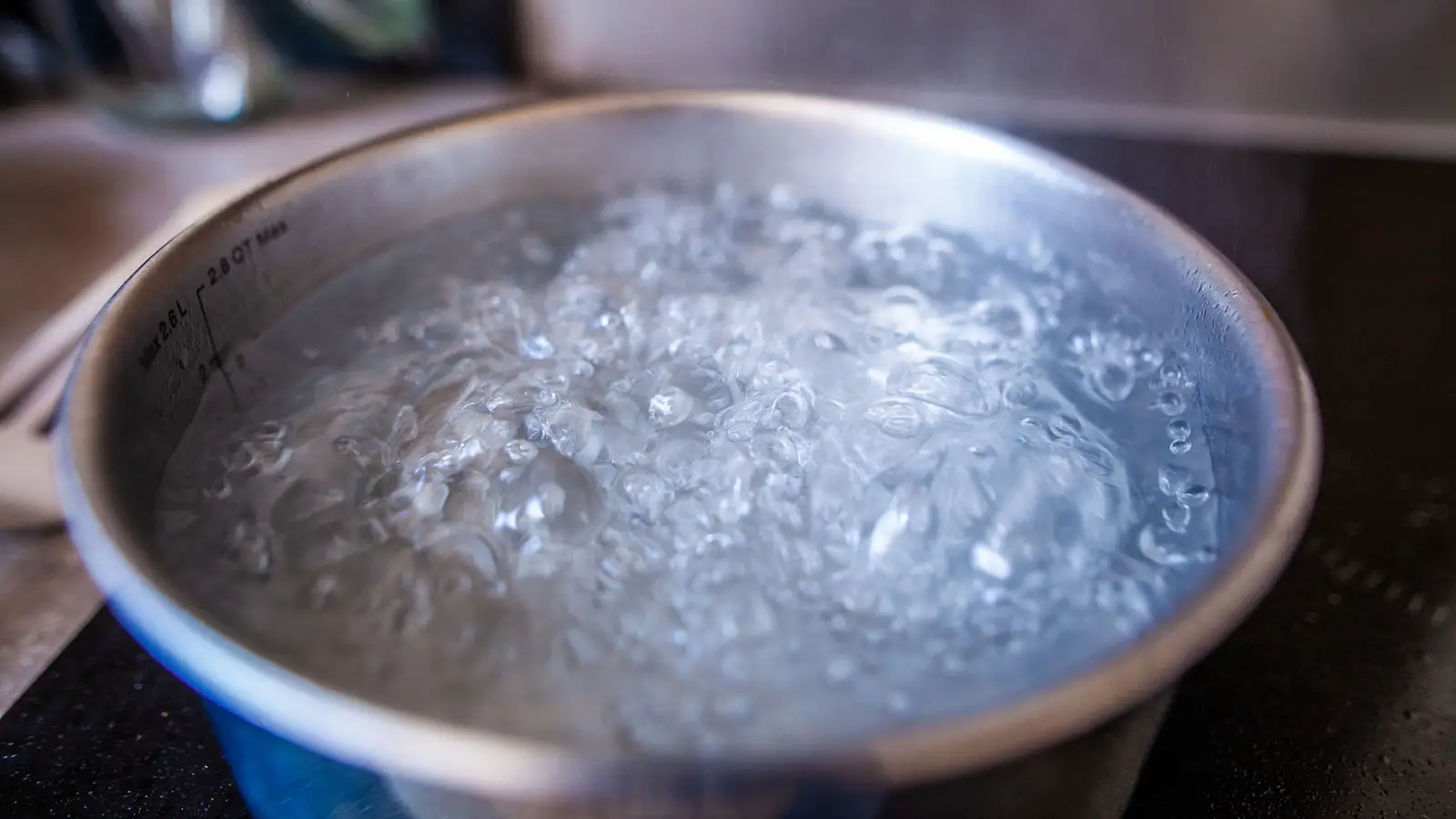
Purified Water
Purified water is one of the best types of water to use for a humidifier. It’s been treated to remove impurities, including minerals, bacteria, and other contaminants. This makes it much less likely to cause problems with your humidifier and helps extend the life of your machine.
This water is purified by going through a reverse osmosis filtration process, which forces water through a very fine membrane to remove impurities.
Additionally, purified water may also be treated with ultraviolet light or ozone to further improve its quality. The main downside of using purified water is that it can be more expensive than other types of water. However, the benefits of using it in your humidifier make it well worth the cost [2].
Boiled Water
Boiled water is another type of water that’s suitable for use in a humidifier. This water has been boiled to kill any bacteria or other contaminants that may be present. The main downside of using boiled water is that it can be time-consuming to prepare and may not remove all impurities from the water. Additionally, if you don’t allow the boiled water to cool completely before using it, you run the risk of damaging your humidifier.
Bottled Water
Bottled water is another option that you can use in your humidifier. This water has been purified and is often of high quality. The main downside of using bottled water is that it can be more expensive than other types of water. Additionally, it’s important to check the label on the bottle to make sure that the water is suitable for use in a humidifier. Some bottled waters may not be pure enough and could still contain impurities that could damage your machine.
Demineralized Water
Demineralized water is water that has had the minerals removed. This can be done through a process of reverse osmosis or by using a water filter. The main benefit of using demineralized water is that it won’t leave any mineral deposits behind in your humidifier.
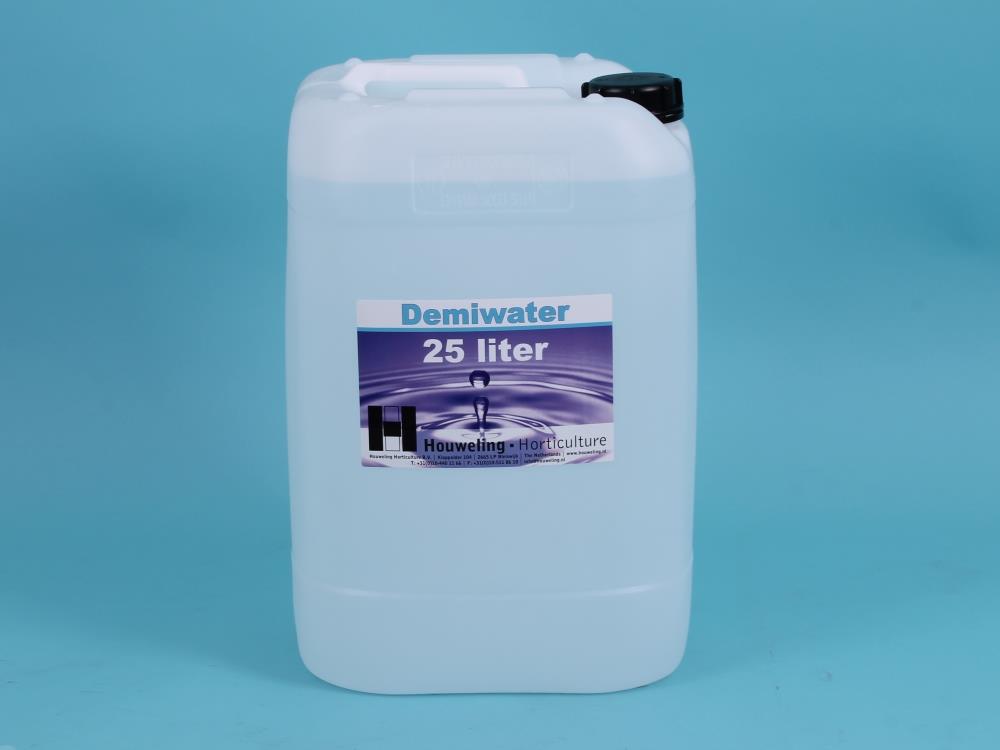
However, it’s important to note that this type of water can be more expensive than other types of water. Additionally, if you use demineralized water in your humidifier, you’ll need to replace the filter more often to prevent impurities from getting into the machine.
Hot vs. Cold Water in a Humidifier
Is it better to use hot or cold water in a humidifier? The answer may surprise you. While most people believe that using hot water in a humidifier is the best way to increase the humidity in the room, this is not the case. Using hot water can damage your humidifier and decrease its efficiency. Here’s some facts why.
In addition, hot water can also promote the growth of bacteria and mold in your humidifier. This is because hot water kills the bacteria that naturally occur in water, making it easier for new bacteria and mold to grow. If you do use hot water in your humidifier, be sure to clean it regularly to prevent the growth of harmful microorganisms.
So, if you’re looking to increase the humidity in your home, it’s best to use cold water in your humidifier. Not only will this protect your humidifier from damage, but it will also help to keep your family healthy by preventing the growth of bacteria and mold [3].
Can You Use Hard Water in a Humidifier?
Hard water is called so because it contains high concentrations of minerals, including calcium and magnesium. These minerals can build up in your humidifier and lead to several problems, such as:
- Reduced efficiency
- Short lifespan
- Frequent maintenance
However, if you use a humidifier with a built-in water filter, you can use hard water without any problems. The filter will remove the minerals from the water, ensuring that they don’t build up in your humidifier. Such a filter should contain activated carbon, which is known for its ability to remove impurities from water.
Moreover, make sure to clean your humidifier regularly to prevent the build-up of minerals [4].
How Often Should You Change Water in a Humidifier?
Most humidifier manufacturers will recommend that you change the water in your humidifier daily. This is to prevent any bacteria or mold from growing in the unit and being released into the air. If you live in an area with hard water, you may need to change the water more often. Hard water can leave deposits in the humidifier that can be released into the air along with the water vapor.
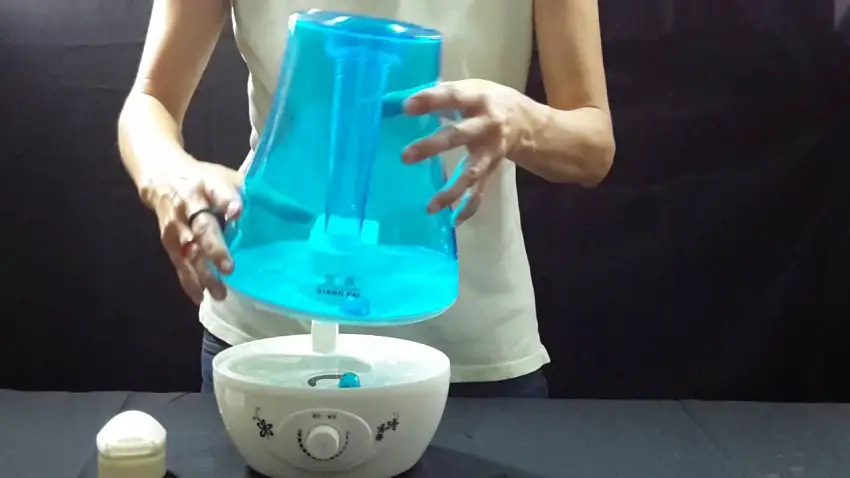
While changing the water daily is the best practice, you may not always have time to do this. If you need to extend the interval between changes, empty the unit and clean it thoroughly at least once a week. This will help prevent bacteria and mold from growing in the unit.
How to maintain the humidifier?
The humidifier should be positioned on a level surface, at least 35 inches away from walls or furniture. To prevent bacteria and mold growth, the humidifier chamber should be cleaned daily and refilled with fresh water. You can use either distilled water or purified water in your humidifier. However, some people prefer to use distilled water because it does not contain minerals that can build up in the humidifier over time. If you use purified water, be sure to change the water more often to prevent bacteria growth. It is also important to clean the humidifier regularly according to the manufacturer’s instructions. To clean the humidifiers follow these steps:
- Unplug the humidifier.
- Remove the water tank and empty it.
- Clean the tank with mild soap and water.
- Rinse the tank thoroughly and dry it before refilling it with water.
- Wipe down the base of the humidifier with a damp cloth.
- Dry the base before plugging in the humidifier and turning it on.
When using a humidifier, it is important to monitor indoor humidity levels. The ideal relative humidity level is between 30-50%. If the humidity level is too high, it can create an environment that is conducive to mold growth. If the humidity level is too low, it can cause respiratory problems. Use a hygrometer to monitor indoor humidity levels and adjust the humidifier accordingly [5].
What is the difference between distilled water and purified water?
The main difference between distilled water and purified water is that distilled water has been boiled to remove impurities, while purified water has been filtered to remove impurities. However, both types of water can contain trace amounts of contaminants.
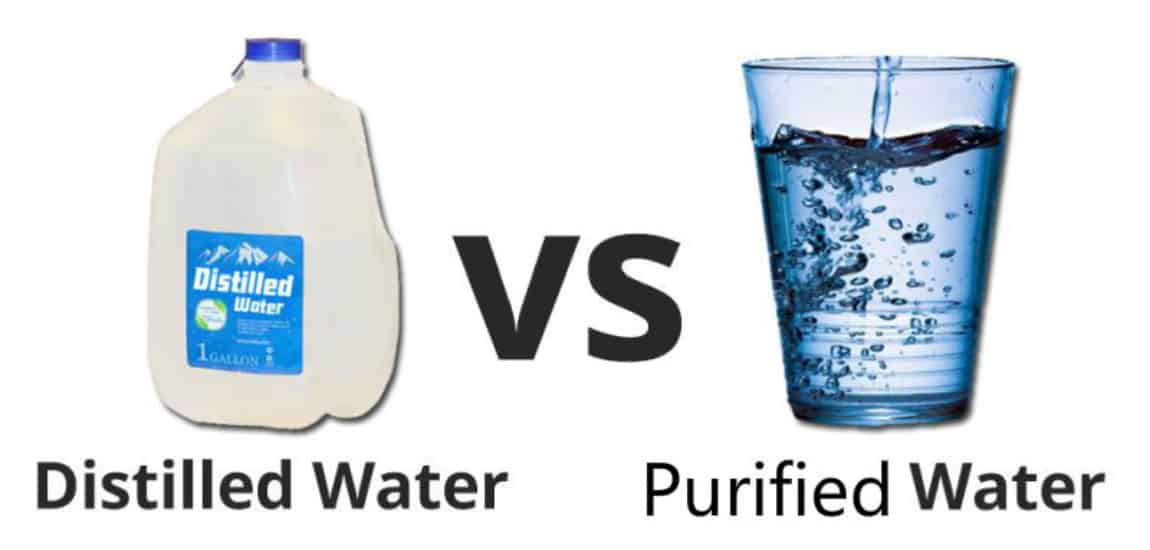
This is because the boiling process removes not only impurities but also minerals that can help to prolong the life of the water. Moreover, distilled water can be more expensive than purified water. Purified water, on the other hand, is typically less expensive than distilled water and can last longer.
Comparison of Water Types for Use in Humidifiers
Choosing the right water for your humidifier is essential for optimal performance and avoiding mineral buildup. Below is a comparison of different water types for use in humidifiers, helping you determine whether purified water is a suitable choice.
| Water Type | Description | Suitable for Humidifiers | Advantages | Considerations |
|---|---|---|---|---|
| Tap Water | Regular tap water from your faucet, which may contain minerals and impurities. | Suitable for humidifiers, but may lead to mineral buildup and white dust over time. | Readily available, cost-effective, and doesn’t require additional purchases. | Regular cleaning and maintenance are necessary to prevent mineral deposits. |
| Distilled Water | Purified water that has undergone a distillation process to remove impurities and minerals. | Highly suitable for humidifiers, as it reduces mineral buildup and white dust issues. | Prevents mineral deposits, extends humidifier lifespan, and maintains air quality. | May incur ongoing costs for purchasing distilled water, but less maintenance is needed. |
| Filtered Water | Water that has been filtered using a water filter, reducing impurities and some minerals. | Suitable for humidifiers, but may still contain some minerals depending on the filter’s effectiveness. | Improves water quality compared to tap water, reducing mineral buildup to some extent. | Filter replacement costs and variable water quality depending on the filter used. |
| Purified Water | Water treated to remove impurities and minerals, such as through reverse osmosis or ion exchange. | Highly suitable for humidifiers, as it provides very pure water with minimal mineral content. | Prevents mineral deposits, extends humidifier lifespan, and ensures the cleanest mist output. | May have higher upfront costs for water purification equipment or ongoing costs for purchasing purified water. |
Explanation of the table:
- The table provides a comparison of different water types for use in humidifiers, including tap water, distilled water, filtered water, and purified water.
- Each water type is described, highlighting its suitability for humidifiers, advantages, and considerations to help you make an informed choice.
FAQ
Can I use purified water instead of distilled water in a humidifier?
The surprising answer is yes! You can use purified water instead of distilled water in a humidifier. While it is true that distilled water is the best type of water to use in a humidifier because it is free of impurities, purified water is a close second.
Purified water has been filtered or processed to remove impurities such as chlorine, chemicals, and minerals.
This makes it ideal for use in a humidifier because it will not leave behind any residue that could potentially clog the machine or cause irritation. So, if you have purified water on hand, go ahead and use it in your humidifier. Your lungs will thank you!
Can you use bottled purified water in a humidifier?
Yes, you can use bottled purified water in a humidifier. This is one of the most convenient ways to get purified water for your humidifier. Simply buy a bottle of purified water at the store and then fill up your humidifier with it.
What can I use instead of distilled water in my humidifier?
You can also boil water to remove impurities. Boil the water for at least three minutes and then let it cool before adding it to your humidifier. This is a good option if you don’t have a filter for your fridge or if you’re traveling and don’t have access to purified water.
In a pinch, you can also use tap water in your humidifier. However, it is not recommended because tap water often contains chemicals and minerals that can be harmful if inhaled. If you must use tap water, be sure to run it through a filter first.
Is it OK to sleep next to a humidifier?
While there is no definitive answer, it is generally safe to sleep next to a humidifier. Just be sure to keep the humidifier clean and free of mold or mildew to avoid breathing in any harmful spores.
How much electricity does a humidifier use?
The answer to this question depends on the type of humidifier you have. A standard humidifier will use about as much electricity as a light bulb. However, if you have an ultrasonic humidifier, it will use less electricity than a standard humidifier.
Can I leave my humidifier on all night?
Yes, you can leave your humidifier on all night. It is often recommended to do so to maintain a consistent level of humidity in your home. Just be sure to empty and refill the water reservoir as needed to avoid damaging the machine.
What happens if I use purified water in my CPAP?
If you use purified water in your CPAP, the machine will work just as well as if you used distilled water. Purified water is free of impurities and will not leave behind any residue that could potentially clog the machine. So, if you have purified water on hand, go ahead and use it in your CPAP.
What is purified water used for?
Purified water is often used in humidifiers and CPAP machines because it is free of impurities. It is also safe to use for drinking, cooking, and bathing. This type of water has been filtered or processed to remove impurities such as chlorine, chemicals, and minerals.
How is purified water made?
Purified water is made by filtering or processing water to remove impurities. This can be done using a variety of methods, such as reverse osmosis, distillation, or deionization.
Is purified water safe to drink?
Yes, purified water is safe to drink. This type of water has been filtered or processed to remove impurities such as chlorine, chemicals, and minerals. So, you can rest assured knowing that the water you’re drinking is free of harmful contaminants.
What are the benefits of drinking purified water?
Drinking purified water has many benefits. First, it is free of impurities that can be harmful to your health. Second, it can help improve the taste of your water. Finally, it can also help reduce your risk of developing certain health conditions, such as kidney stones.
What are the disadvantages of drinking purified water?
While there are many benefits to drinking purified water, there are also a few disadvantages. First, it can be more expensive than regular tap water. Second, it may contain trace amounts of impurities that were not removed during the purification process.
Is it safe to use purified water in a humidifier?
Yes, using purified water in a humidifier is safe and can be a suitable alternative to distilled water. Purified water is generally free from minerals and impurities that can lead to mineral buildup in the humidifier.
What are the advantages of using purified water in a humidifier?
Using purified water in a humidifier can help prevent mineral deposits and white dust buildup. It may also lead to cleaner and healthier air, especially if your tap water has a high mineral content.
What types of purified water can I use in a humidifier?
You can use various types of purified water, including reverse osmosis water, deionized water, and filtered water. These types are generally free from minerals and contaminants that can affect your humidifier.
Is purified water more cost-effective than using distilled water in a humidifier?
The cost-effectiveness of using purified water in a humidifier depends on your access to purified water sources and the price of distilled water in your area. In some cases, using purified water may be more cost-effective.
Can using purified water extend the lifespan of my humidifier?
Using purified water can help extend the lifespan of your humidifier by reducing mineral buildup and potential damage caused by mineral deposits. Regular cleaning is still essential for maintenance.
Are there any situations where using purified water is not recommended for a humidifier?
Using purified water is generally safe for most humidifiers. However, in situations where extremely pure water is required, such as for certain medical equipment, consult your device’s manufacturer for specific water quality recommendations.
Can I use tap water treated with a water softener in a humidifier instead of purified water?
Using tap water treated with a water softener in a humidifier is generally not recommended. Water softeners replace minerals with sodium ions, which may still leave behind residue in the humidifier and affect its performance.
Is there a specific way to prepare purified water for my humidifier?
To prepare purified water for your humidifier, simply fill the water tank with the purified water of your choice. There is usually no need for additional preparation, as purified water is typically ready for use.
Useful Video: Benefits Of Distilled Water In Humidifier
Conclusion
The use of purified water in a humidifier is recommended by many manufacturers. However, it is important to note that not all humidifiers are created equal. While some models may work well with purified water, others may not. It is always best to consult your humidifier’s owner’s manual before using any type of water other than what is recommended. If you do decide to use purified water in your humidifier, be sure to change the water frequently. Purified water does not contain the minerals that help to keep your humidifier clean and free of bacteria. As a result, it is more likely to become contaminated over time.
References
- https://blog.homedics.com/air/how-does-a-humidifier-work/
- https://hvactrainingshop.com/what-type-of-water-do-you-use-in-a-humidifier/
- https://bestcheaphumidifier.com/do-you-put-hot-or-cold-water-in-humidifier/
- https://www.humidifierinspired.com/why-is-hard-water-problematic-for-humidifiers/
- https://www.webmd.com/lung/humidifier-use-clean#





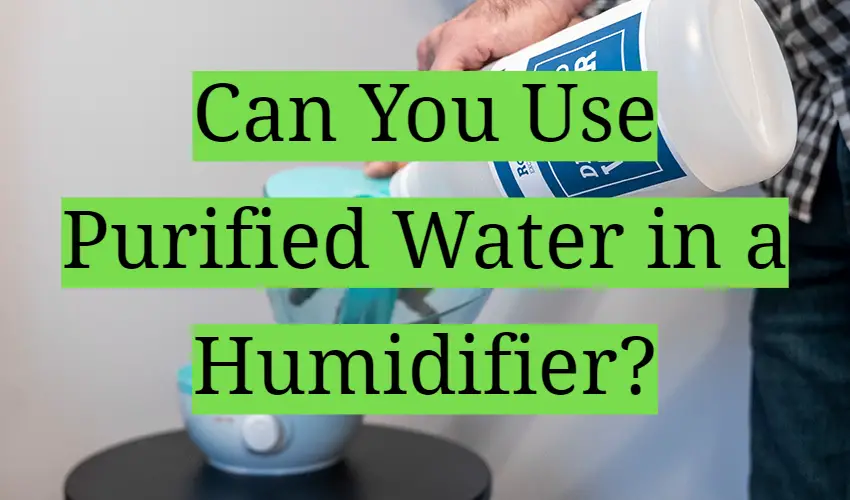




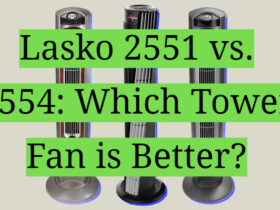

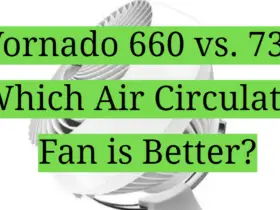

Leave a Reply